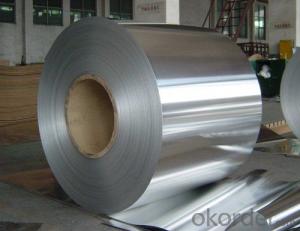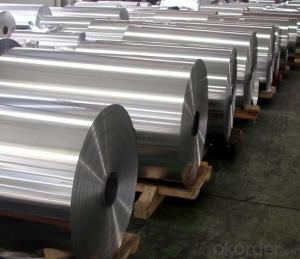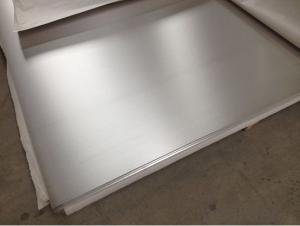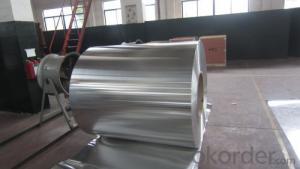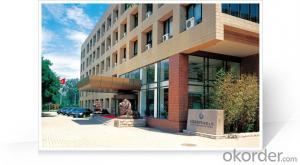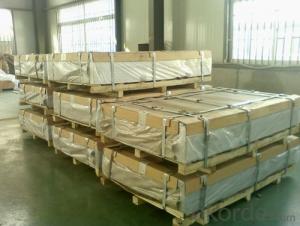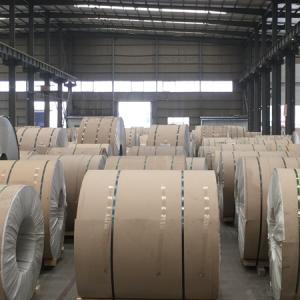Flat Rolled Aluminum Coil Windsor - 1050 1100 3003 5052 5754 5083 6061 7075 H24 Metal Alloy Aluminum Sheet
- Loading Port:
- Shanghai
- Payment Terms:
- TT OR LC
- Min Order Qty:
- 2 m.t.
- Supply Capability:
- 6000 m.t./month
OKorder Service Pledge
OKorder Financial Service
You Might Also Like
Specification
1050 1100 3003 5052 5754 5083 6061 7075 H24 Metal Alloy Aluminum Sheet
Packaging & Delivery
Name | 3003 Aluminum Coil |
ALloy or Not | Yes |
Alloy | 1100H-18, 3003-H24,3003-H26,3005-H26,8011,3004,3105,5005,etc. |
Thickness | 0.1~1.5mm |
Width | <2000mm< span=""> |
MOQ | 1 MT |
Coating finish | Brushed, drawing, embossed, printing |
Color | As to code RAL |
Surface | Embossed,Mill Finish,Coated,Brushed |
Gloss | 10-90%(EN ISO-2813:1994) |
Total coating thick | PVDF27 ~35micron |
Polyester18~27micron(EN ISO-2360:1995) | |
Coating hardness | 2H |
Adhesion | 5B (EN ISO-2409:1994) |
Impact resistance | No cracking and peeling (A.S.T.M D2794-1993) |
Flexibility (T-bend) | 0T- 2T |
MEK resistance | 100 |
Certification | ISO9001:2000, CE, SGS |
Coil's standard diameter | 1100mm |
Inner Diameter | 405mm/505mm |
Coil's standard weight | 1MT - 2MT |
Product Specification | |
Grade | 1000 Series: 1050 1060 1100 3000 Series: 3003 3004 3105 5000 Series: 5052 5605,5083 6000 Series: 6061 6063 8000 Series: 8011 8021 8079 |
Thickness | 0.20-8.00mm |
Width | 2400mm max. |
Grade | 1000,3000,5000,6000,8000series |
Coil ID | 75mm, 150mm, 200mm, 300mm, 400mm, 508mm or negotiable |
Coil weight | 1000-5000kgs |
Coil OD | 1700mm max. |
Temper | O, H12, H14, H16, H111, H22 ,H24, H26, H28,T4, T6,etc. |
Chemical Composition | |||||||||
| Grade | Si | Fe | Cu | Mn | Mg | Cr | Ni | Zn | Al |
| 1050 | 0.25 | 0.4 | 0.05 | 0.05 | 0.05 | - | - | 0.05 | 99.5 |
| 1060 | 0.25 | 0.35 | 0.05 | 0.03 | 0.03 | - | - | 0.05 | 99.6 |
| 1070 | 0.2 | 0.25 | 0.04 | 0.03 | 0.03 | - | - | 0.04 | 99.7 |
| 1100 | Si+Fe:0.95 | 0.05-0.2 | 0.05 | - | - | 0.1 | - | 99 | |
| 1200 | Si+Fe:1.00 | 0.05 | 0.05 | - | - | 0.1 | 0.05 | 99 | |
| 1235 | Si+Fe:0.65 | 0.05 | 0.05 | 0.05 | - | 0.1 | 0.06 | 99.35 | |
| 3003 | 0.6 | 0.7 | 0.05-0.2 | 1.0-1.5 | - | - | - | 0.1 | remains |
| 3004 | 0.3 | 0.7 | 0.25 | 1.0-1.5 | 0.8-1.3 | - | - | 0.25 | remains |
| 3005 | 0.6 | 0.7 | 0.25 | 1.0-1.5 | 0.20-0.6 | 0.1 | - | 0.25 | remains |
| 3105 | 0.6 | 0.7 | 0.3 | 0.30-0.8 | 0.20-0.8 | 0.2 | - | 0.4 | remains |
| 3A21 | 0.6 | 0.7 | 0.2 | 1.0-1.6 | 0.05 | - | - | 0.1 | remains |
| 5005 | 0.3 | 0.7 | 0.2 | 0.2 | 0.50-1.1 | 0.1 | - | 0.25 | remains |
| 5052 | 0.25 | 0.4 | 0.1 | 0.1 | 2.2-2.8 | 0.15-0.35 | - | 0.1 | remains |
| 5083 | 0.4 | 0.4 | 0.1 | 0.40-1.0 | 4.0-4.9 | 0.05-0.25 | - | 0.25 | remains |
| 5154 | 0.25 | 0.4 | 0.1 | 0.1 | 3.1-3.9 | 0.15-0.35 | - | 0.2 | remains |
| 5182 | 0.2 | 0.35 | 0.15 | 0.20-0.50 | 4.0-5.0 | 0.1 | - | 0.25 | remains |
| 5251 | 0.4 | 0.5 | 0.15 | 0.1-0.5 | 1.7-2.4 | 0.15 | - | 0.15 | remains |
| 5754 | 0.4 | 0.4 | 0.1 | 0.5 | 2.6-3.6 | 0.3 | - | 0.2 | remains |
| 6061 | 0.40-0.8 | 0.7 | 0.15-0.40 | 0.15 | 0.8-1.2 | 0.04-0.35 | - | 0.25 | remains |
| 6063 | 0.20-0.6 | 0.35 | 0.1 | 0.1 | 0.45-0.9 | 0.1 | - | 0.1 | remains |
| 6082 | 0.7-1.3 | 0.5 | 0.1 | 0.40-1.0 | 0.6-1.2 | 0.25 | - | 0.2 | remains |
| 6A02 | 0.50-1.2 | 0.5 | 0.20-0.6 | Or Cr0.15-0.35 | 0.45-0.9 | - | - | 0.2 | remains |
| 8011 | 0.50-0.9 | 0.6-1.0 | 0.1 | 0.2 | 0.05 | 0.05 | - | 0.1 | remains |
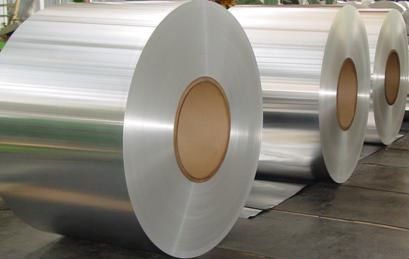
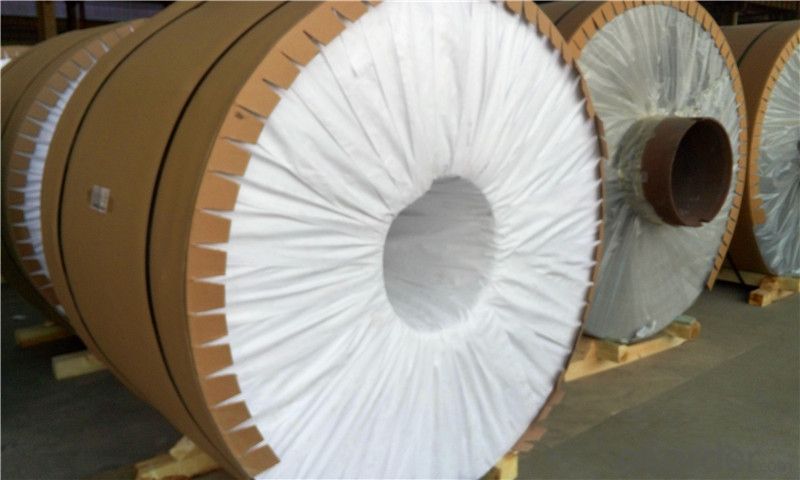
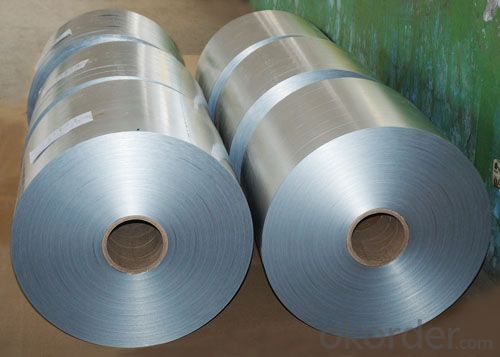
- Q: What are the rules or laws governing the use of aluminum coils?
- <p>Yes, there are regulations on the use of aluminum coils, which vary by country and industry. These regulations often pertain to safety, quality standards, and environmental impact. For instance, in the construction industry, aluminum coils used for roofing or cladding must meet specific standards for strength and durability. In food packaging, regulations may dictate the type of aluminum alloys used to prevent contamination. Additionally, there are environmental regulations that govern the disposal and recycling of aluminum coils to minimize their impact on the environment. Compliance with these regulations is crucial for manufacturers, suppliers, and users of aluminum coils to avoid legal penalties and ensure public safety.</p>
- Q: Are aluminum coils resistant to oil and grease?
- Yes, aluminum coils are generally resistant to oil and grease.
- Q: Are there any limitations to the minimum coil width of aluminum coils?
- Yes, there are limitations to the minimum coil width of aluminum coils. The minimum coil width is determined by various factors, including the manufacturing process and the equipment used. Generally, the coil width is limited by the capabilities of the rolling mill or other processing machinery. The minimum coil width is typically determined by the size of the rolls or mandrels used in the production process. If the coil width is too narrow, it may cause issues with the stability and integrity of the coil, making it more difficult to handle and transport. Additionally, a narrower coil width may also affect the overall efficiency of the manufacturing process. Therefore, it is important to consider these limitations when determining the minimum coil width for aluminum coils.
- Q: Are aluminum coils suitable for insulation jacketing?
- Indeed, insulation jacketing can be effectively achieved with aluminum coils. Renowned for their exceptional thermal properties, durability, and resistance to corrosion, aluminum coils are a highly favored choice for jacketing material. They find extensive application across diverse industries such as HVAC, oil and gas, and petrochemical, where they serve to insulate pipe systems and equipment. By enveloping insulation materials, aluminum coils play a crucial role in safeguarding against moisture infiltration and sustaining thermal efficiency. Moreover, their lightweight composition ensures effortless installation and transportation. Ultimately, aluminum coils emerge as a dependable and efficient solution for insulation jacketing endeavors.
- Q: What are the different types of alloys used for aluminum coils?
- There are several different types of alloys that are commonly used for aluminum coils. The most commonly used alloy for aluminum coils is 3003. This alloy is known for its excellent corrosion resistance and moderate strength. It is often used in applications where high strength is not required, such as in roofing and siding. Another commonly used alloy for aluminum coils is 5052. This alloy has good weldability and formability, making it suitable for a wide range of applications. It is often used in the automotive industry for body panels and fuel tanks. 6061 is another popular alloy for aluminum coils. This alloy has excellent strength and is often used in structural applications. It is commonly used in the aerospace industry for aircraft parts and in the construction industry for structural components. Other alloys that are used for aluminum coils include 1100, 5005, and 8011. Each of these alloys has its own unique properties and characteristics, making them suitable for different applications. For example, 1100 is known for its high electrical conductivity and is often used in electrical applications, while 8011 is commonly used for packaging and food containers due to its excellent corrosion resistance. In summary, the different types of alloys used for aluminum coils include 3003, 5052, 6061, 1100, 5005, and 8011. These alloys offer a range of properties and characteristics that make them suitable for various applications across industries such as automotive, aerospace, construction, and packaging.
- Q: Can aluminum coils be used for seamless gutters?
- Seamless gutters can indeed utilize aluminum coils. The reason aluminum is favored for gutter systems is its ability to withstand wear, its lightweight composition, and its resistance to rust. Aluminum coils are frequently employed in the construction of seamless gutters, which boast several advantages over the more traditional sectional gutters. Custom-made on-site, seamless gutters guarantee a flawless fit for the specific measurements of a structure. This eliminates the necessity for seams, which are susceptible to leaks and require regular maintenance. Moreover, aluminum is malleable, making it easy to shape seamless gutters to accommodate a building's unique design. In summary, aluminum coils present a practical and efficient option for the creation of seamless gutters.
- Q: How do aluminum coils contribute to the aesthetics of a building?
- Aluminum coils can significantly contribute to the aesthetics of a building due to their versatility, durability, and aesthetic appeal. Firstly, aluminum coils can be easily shaped, cut, and formed into various architectural designs, allowing for greater flexibility in achieving the desired aesthetic of a building. Whether it is a sleek and modern look or a more traditional and ornate design, aluminum coils can be customized to meet the specific aesthetic requirements of a project. Additionally, aluminum coils come in a wide range of colors and finishes, enabling architects and designers to choose from a diverse palette to match the overall theme or style of a building. The option to select from different shades, textures, and patterns allows for endless possibilities in creating visually appealing facades and exteriors. Furthermore, aluminum is known for its durability and resistance to corrosion, making it an ideal material for architectural applications. The use of aluminum coils in a building ensures that the exterior surfaces will maintain their aesthetic appeal for an extended period, with minimal maintenance required. This durability makes aluminum coils a cost-effective choice for maintaining the aesthetics of a building in the long run. Moreover, aluminum coils can contribute to the energy efficiency of a building. They possess excellent thermal conductivity, allowing them to effectively dissipate heat and reduce the energy consumption required for temperature control. This energy-saving feature not only enhances the sustainability of a building but also adds to its overall aesthetic appeal by incorporating environmentally conscious design elements. In conclusion, aluminum coils contribute to the aesthetics of a building by providing flexibility in design, a wide range of color and finish options, durability, and energy efficiency. These qualities allow architects and designers to create visually appealing structures that align with the desired aesthetic vision while ensuring long-lasting beauty and sustainability.
- Q: On Square-D service panels, are the main lugs rated for aluminum wire? Or do I need to use an anti-oxidant compound? What about on Milbank outdoor meter bases?
- Aluminum to Aluminum they say you do not need an inhibitor. I have still aways used it as has every electrical contractor I have worked for for 30 years. Utility companies use it on all meter bases as well. The oxidation can still be persistent so I suggest you use it and torque them to the manufactures labeling. So many people over tighten the conductors and this is a major problem because aluminum is very soft it does have a torque guideline for each conductor size as well as the lug it is attached to. Electrical Contractor ||
- Q: Can the little can opening cap things on an aluminum can be recycled? My friend told me if you fill a two liter bottle with them you can get loads of cash. Is this true?
- Of okorder .
- Q: What are the safety regulations that need to be followed while using aluminum coil?
- <p>Yes, there are safety regulations for using aluminum coil. These include ensuring proper ventilation to prevent the buildup of aluminum dust, which can be a fire hazard. Protective equipment such as gloves and eyewear should be worn to avoid skin and eye contact with the material. Additionally, it's crucial to follow guidelines for handling and storing aluminum coils to prevent accidents, such as ensuring they are not damaged or exposed to extreme temperatures. Compliance with local and industry-specific safety standards is also essential to maintain a safe working environment.</p>
Send your message to us
Flat Rolled Aluminum Coil Windsor - 1050 1100 3003 5052 5754 5083 6061 7075 H24 Metal Alloy Aluminum Sheet
- Loading Port:
- Shanghai
- Payment Terms:
- TT OR LC
- Min Order Qty:
- 2 m.t.
- Supply Capability:
- 6000 m.t./month
OKorder Service Pledge
OKorder Financial Service
Similar products
Hot products
Hot Searches
Related keywords
